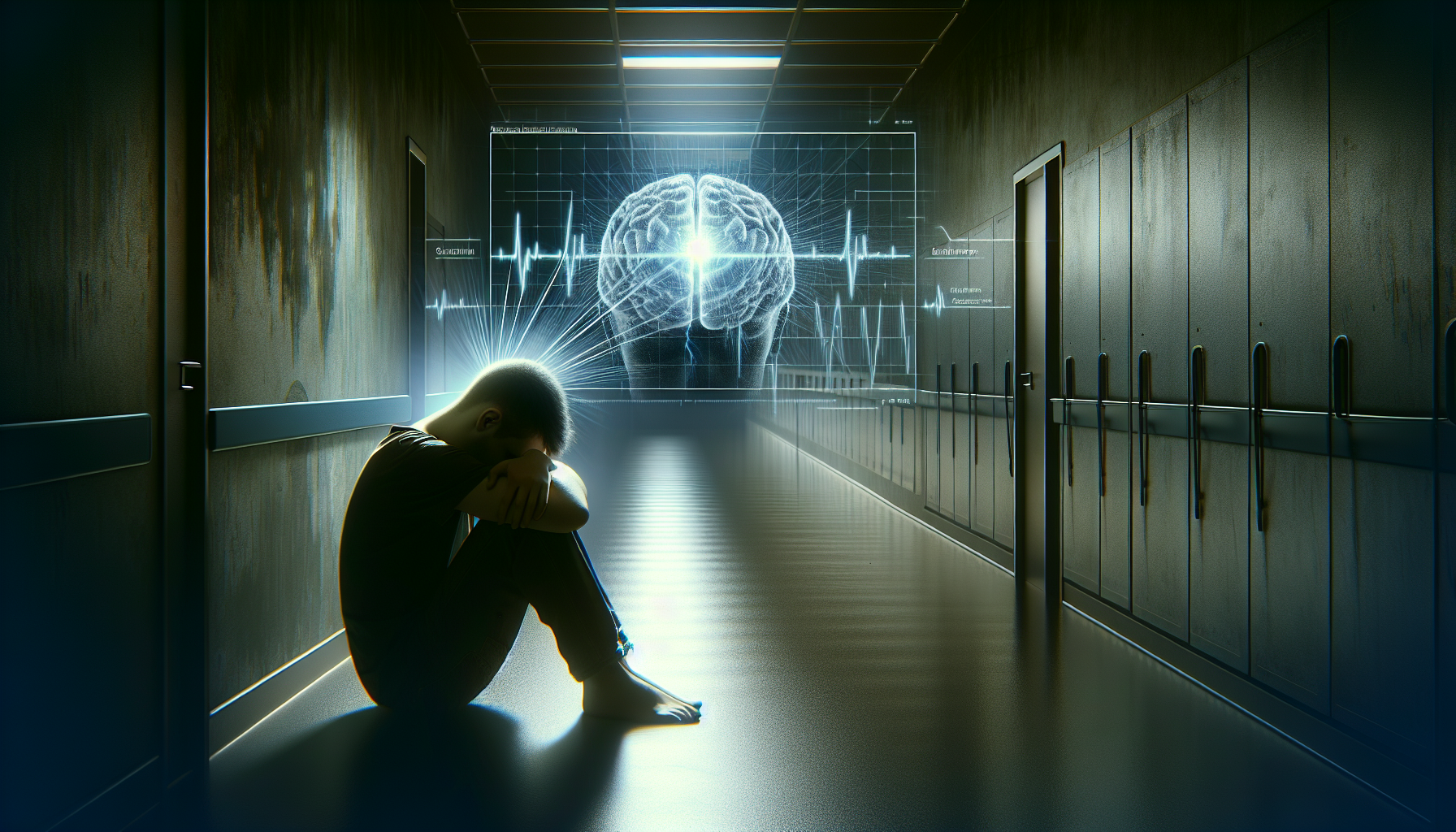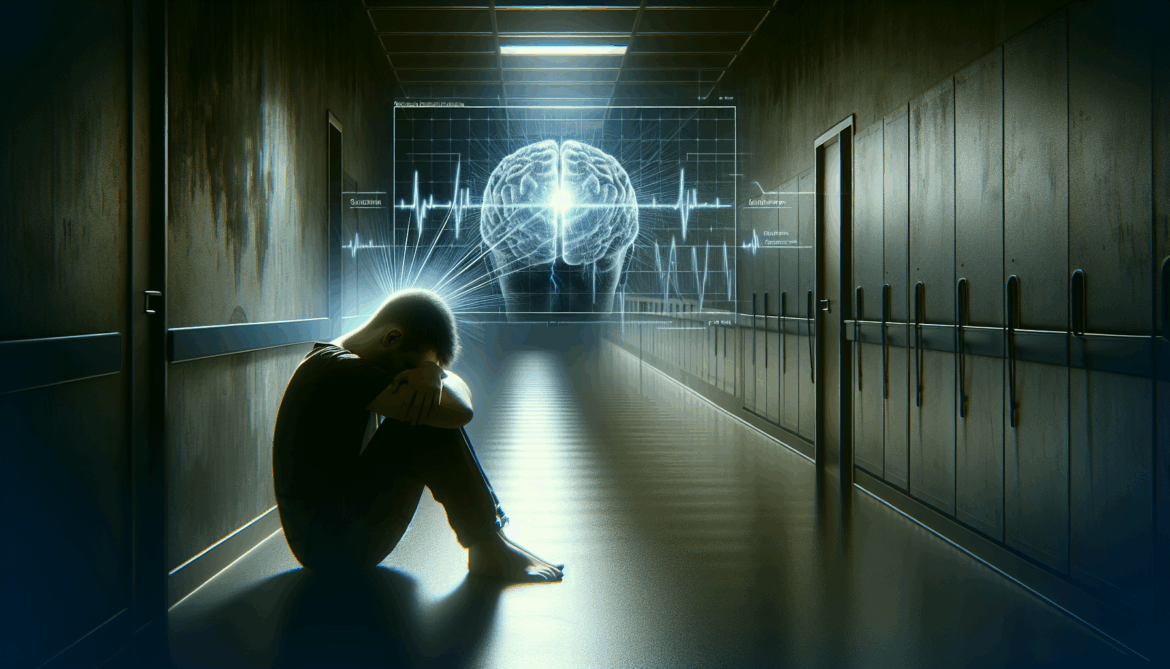
Mild traumatic brain injury (mTBI) occurs when a sudden blow or jolt to the head disrupts normal brain function. Although often referred to as a “mild” injury, the consequences can be anything but. In many cases, individuals experience a range of physical, cognitive, and emotional symptoms that can persist for days, weeks, or even months. This persistence of symptoms is commonly associated with post-concussion syndrome (PCS), a condition that can significantly affect quality of life.
mTBI typically results from falls, road traffic accidents, sports injuries, or physical assaults. Despite being widespread, it frequently goes undiagnosed, as the alterations in brain function may not always be evident on standard imaging tests such as CT scans or MRIs. The absence of visible abnormalities can make it challenging for healthcare providers to assess the severity of the injury and initiate timely intervention.
The initial presentation of a mild traumatic brain injury often includes confusion, headaches, dizziness, blurred vision, nausea, and temporary loss of consciousness. However, many people recover fully within a few weeks with appropriate rest and care. When lingering symptoms such as memory problems, difficulty concentrating, irritability, and sleep disturbances persist beyond the usual recovery period, there is a heightened concern for PCS.
Understanding that mTBI recovery is not a uniform process is crucial. Several factors, such as the individual’s age, pre-existing health conditions, and history of previous concussions, can influence recovery trajectories. It is essential for healthcare professionals and patients alike to recognise that even a seemingly minor head injury can set the stage for enduring and debilitating symptoms that require a well-coordinated care approach.
Symptoms and diagnosis of post-concussion syndrome
Post-concussion syndrome (PCS) is characterised by a complex array of lingering symptoms that persist well beyond the typical mTBI recovery period. These symptoms can be physical, cognitive, emotional, or a combination of all three, making diagnosis a nuanced and often challenging process. Common physical complaints include persistent headaches, dizziness, fatigue, sensitivity to light and noise, and disturbances in balance and coordination. Cognitive impairments, such as difficulty with memory, attention, and executive functioning, are also frequently reported and can significantly impact daily activities and occupational performance.
In addition to physical and cognitive symptoms, emotional and behavioural changes are hallmark features of PCS. Individuals may experience increased irritability, anxiety, depression, and mood swings. Sleep disorders, including insomnia and fragmented sleep patterns, are also prevalent, exacerbating other symptoms and complicating recovery. The broad and varied symptomatology, combined with the subjective nature of many complaints, underscores the importance of a thorough and multidisciplinary approach to diagnosis.
Diagnosis of PCS is predominantly clinical, relying heavily on patient history, symptom reporting, and validated questionnaires or rating scales. There are no specific biomarkers or imaging tests definitively capable of diagnosing PCS, although neuropsychological assessments can provide valuable insights into cognitive deficits. The diagnosis is typically made if symptoms persist for more than several weeks following mTBI and if no alternate explanation can account for the clinical presentation.
Clinicians must also rule out other conditions that can mimic PCS, such as depression, post-traumatic stress disorder (PTSD), or underlying neurological illnesses. Misdiagnosis can lead to ineffective treatments and prolonged suffering; therefore, careful assessment and a high index of suspicion are vital, especially when dealing with patients whose symptoms follow an otherwise mild head injury. Early identification and intervention are key to improving outcomes and helping individuals regain their quality of life following mTBI.
Factors influencing recovery and risk
Recovery following a mild traumatic brain injury is a highly individualised process, and numerous factors can influence both the pace and completeness of mTBI recovery. Age is a significant determinant; younger individuals often recover more swiftly, whereas older adults may experience more pronounced and prolonged symptoms. Pre-existing medical or psychiatric conditions, such as migraines, depression, or anxiety disorders, can also complicate recovery, making individuals more susceptible to lingering symptoms. A history of previous concussions substantially increases the risk of developing post-concussion syndrome (PCS), as cumulative brain injuries can have a compounding effect on neural function.
The severity and nature of the initial injury itself play a critical role. Those who experience more intense initial symptoms — such as longer durations of loss of consciousness or more profound cognitive confusion — are at a greater risk of persistent symptoms. However, it is important to note that even individuals with seemingly minor immediate symptoms can develop PCS. The individual’s response to injury, including how quickly they resume daily activities or return to sports or work, can either facilitate or hinder recovery. Premature exertion, both physical and cognitive, is known to prolong mTBI recovery and exacerbate lingering symptoms.
Psychosocial factors, such as stress levels, social support systems, and coping mechanisms, also significantly affect recovery outcomes. Patients with strong support networks and effective stress management strategies tend to fare better than those coping with high stress or social isolation. Additionally, those who have a strong understanding of their condition and realistic expectations about their recovery tend to experience more favourable outcomes. On the contrary, catastrophising symptoms or harbouring misconceptions about mTBI can reinforce symptom persistence and impede healing.
Healthcare access and quality of early intervention are crucial components. Individuals who receive timely education about mTBI, appropriate symptom management strategies, and coordinated multidisciplinary care are more likely to recover fully and avoid the development of chronic PCS. Identifying at-risk individuals early and implementing personalised management plans can significantly alter the trajectory towards a more positive mTBI recovery.
Management strategies and treatment options
Effective management of post-concussion syndrome (PCS) requires a comprehensive, multidisciplinary approach tailored to the individual’s unique constellation of symptoms. Given the complexity and variability of PCS presentations, no single treatment regimen fits all cases. Management often focuses on symptom relief, functional restoration, and emotional support to aid mTBI recovery and improve quality of life.
Education is one of the first and most crucial steps in management. Providing patients with clear information about PCS, setting realistic expectations for recovery, and reassuring them about the typical course of lingering symptoms can reduce anxiety and foster a proactive mindset. Early education minimises the risk of symptom exacerbation driven by fear or misunderstanding and empowers individuals to participate actively in their healing process.
Pharmacological treatments may be employed to address specific symptoms but are not the primary mode of therapy. For example, analgesics can help manage persistent headaches, while antidepressants might be considered for those struggling with significant mood disturbances or sleep disorders. However, medications are usually used judiciously, with careful monitoring, to avoid masking symptoms that could complicate ongoing evaluation and recovery assessments.
Rehabilitation therapies are often integral components of PCS management. Cognitive rehabilitation is especially beneficial for those experiencing memory, concentration, and executive function problems, helping retrain the brain in affected areas. Physiotherapy can assist individuals suffering from balance issues, neck pain, or vestibular dysfunction, which are frequently overlooked causes of lingering symptoms. Additionally, occupational therapy can provide strategies for resuming everyday tasks gradually and safely, helping to prevent overexertion and setbacks during mTBI recovery.
Psychological support plays a pivotal role. Cognitive-behavioural therapy (CBT) has shown efficacy in treating depression, anxiety, and stress-related symptoms arising from PCS. Addressing the emotional and mental health aspects not only improves overall wellbeing but can also shorten the course of recovery by mitigating the psychosocial factors that contribute to symptom persistence. For some patients, involvement in group therapy or peer support groups offers valuable encouragement and a sense of community.
Gradual return-to-activity plans are essential. Rushed engagement in strenuous activities, whether physical or intellectual, can aggravate PCS symptoms and further delay recovery. Patients are encouraged to pace themselves, balancing rest with gradual reintroduction of activity, closely monitoring for any resurgence of symptoms. Structured return-to-work or return-to-school programmes, often developed in collaboration with medical professionals, help ensure that individuals are not overwhelmed during the delicate stages of mTBI recovery.
Emerging treatments continue to be explored, including neuromodulation therapies such as transcranial magnetic stimulation and virtual reality-based rehabilitation exercises. While these innovations show promise, further research is required to establish their effectiveness and accessibility for the broader PCS population.
Ultimately, successful management of post-concussion syndrome hinges on an individualised approach that acknowledges the interdependence of physical, cognitive, and emotional domains. By adopting comprehensive, tailored strategies, healthcare providers can not only alleviate lingering symptoms but support a more complete and sustainable recovery for those navigating the challenges of PCS.
Long-term outlook and coping mechanisms
While many individuals recovering from mild traumatic brain injury (mTBI) find their symptoms resolve within weeks, for a subset, lingering symptoms persist for months or even years, profoundly impacting their everyday functioning and overall wellbeing. The long-term outlook for those with post-concussion syndrome (PCS) varies widely and is influenced by a confluence of biological, psychological, and social factors. Although many patients do gradually improve with time and appropriate interventions, others may experience chronic difficulties requiring sustained management efforts.
One of the significant challenges in the long-term management of PCS is dealing with the unpredictability of symptom progression. Fluctuating cognitive issues, persistent headaches, emotional instability, and sleep disturbances can complicate mTBI recovery and strain personal and professional relationships. As such, developing effective coping mechanisms is vital in fostering resilience and improving quality of life. While complete symptom resolution may not always be attainable, adapting through positive lifestyle changes and targeted therapies can help individuals regain a meaningful degree of functionality and independence.
Building a structured daily routine is often beneficial for those struggling with cognitive and emotional regulation. Allocating time for regular rest, scheduling tasks according to peak energy periods, and avoiding overexertion help prevent exacerbations of lingering symptoms. Many individuals find that maintaining a consistent sleep schedule, incorporating light exercise, and prioritising proper nutrition have measurable effects on their overall symptom burden. Mindfulness practices, including meditation and breathing exercises, are also frequently recommended to manage stress and enhance emotional stability.
Psychological counselling remains a cornerstone of long-term coping strategies. Ongoing support from therapists familiar with brain injury rehabilitation can help individuals address maladaptive thought patterns, manage anxiety or depressive symptoms, and set achievable goals for personal recovery. Cognitive-behavioural therapy (CBT) in particular has demonstrated effectiveness in supporting emotional adjustment to PCS-related limitations and challenges. Peer support groups, whether in person or online, provide an additional layer of emotional reinforcement and an important reminder that recovery is not a solitary journey.
For those with persistent cognitive complaints, continued engagement in cognitive rehabilitation exercises can offer gradual but meaningful improvement. Memory aids, organisational tools, and strategy training for problem-solving are invaluable resources that can bolster confidence and competence over time. Continued collaboration with occupational therapists can also ensure that individuals maintain engagement in rewarding activities and achieve a healthy balance between obligations and rest throughout their mTBI recovery.
Regular follow-up appointments with healthcare providers are essential to monitor progress, adjust management plans, and explore emerging treatment options where appropriate. Advances in neurorehabilitation, such as biofeedback techniques and neuromodulation therapies, show promise for addressing some of the more resistant PCS symptoms, though access and research into long-term outcomes are ongoing. Those experiencing significant financial or occupational disruptions due to PCS are encouraged to seek guidance from vocational rehabilitation specialists who can assist in developing adaptive employment strategies or alternative career planning tailored to their capabilities.
Acknowledging and validating the invisible nature of lingering symptoms is critical not just for patients but for their support networks as well. Family education programmes can help loved ones understand that continued difficulties are not a result of a lack of effort but rather a manifestation of a complex and often underestimated medical condition. Empathy, patience, and open communication form the bedrock of sustained support systems that empower individuals coping with PCS to navigate setbacks and celebrate incremental victories during their recovery journey.

